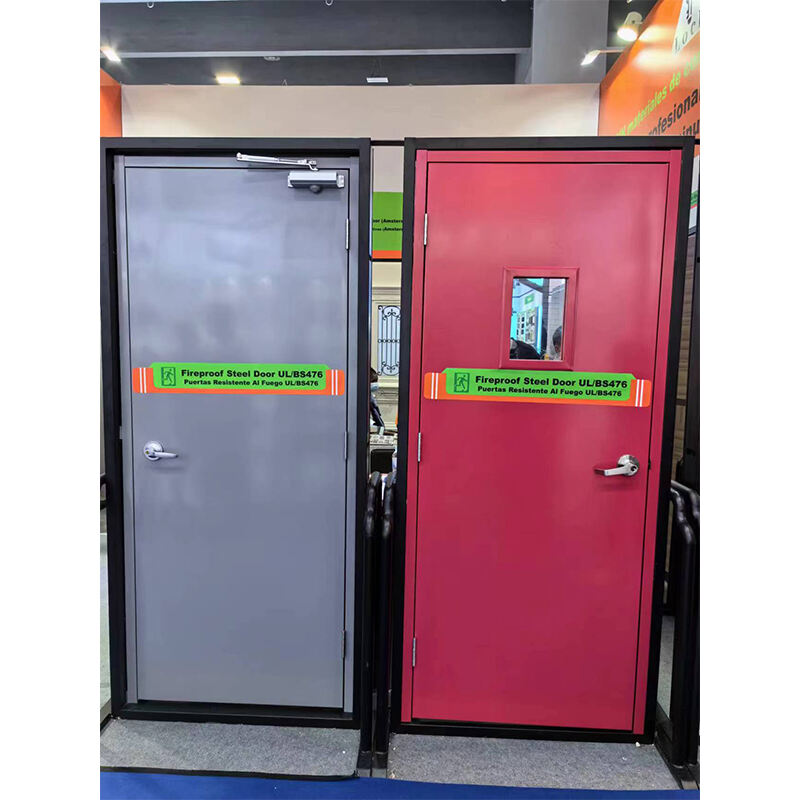ChatGPT 说:
What Are the Benefits of Installing Fireproof Doors in Commercial Buildings?
In modern architecture and building design, safety is one of the most important considerations. Commercial buildings host large numbers of people every day, from employees and clients to visitors and maintenance staff. Ensuring their safety in case of an emergency is a legal and ethical responsibility for every property owner or manager. Among the many safety systems installed in buildings, fireproof doors stand out as both a preventive and protective measure.
Fireproof doors are not only about complying with building codes; they are vital barriers that can save lives, protect property, and minimize disruption to business operations. This article explores in depth the benefits of installing fireproof doors in commercial buildings, including their role in fire safety, compliance, insurance, cost savings, and overall building design.
Understanding Fireproof Doors
Fireproof doors, also known as fire-rated doors, are specially constructed to resist the spread of fire and smoke for a specified period of time. They are usually made from materials such as steel, gypsum, timber with special coatings, or combinations of these. Fireproof doors are tested and rated according to the length of time they can withstand fire, often ranging from 30 minutes to 3 hours.
These doors are designed not just to endure flames but also to maintain their integrity under extreme heat. They usually include components such as fire-resistant glass panels, smoke seals, and automatic closing mechanisms to ensure they function effectively during an emergency.
Fire Safety and Life Protection
The most immediate benefit of installing fireproof doors is life safety. In the event of a fire, flames and smoke spread quickly through open spaces and corridors. Without barriers, evacuation becomes dangerous, and occupants are exposed to toxic smoke and extreme heat.
A fireproof door creates a physical barrier that slows the spread of fire and smoke. By compartmentalizing a building, it ensures that people in unaffected areas have enough time to evacuate safely. Stairwells, corridors, and exit routes remain passable for longer, reducing panic and congestion during emergency evacuations.
For example, in a high-rise office, a fireproof door installed at the stairwell can keep escape routes clear, while in a shopping mall, fireproof doors separating sections prevent fire from engulfing the entire facility at once.
Compliance with Building Codes and Regulations
Every commercial building must comply with local fire safety regulations and building codes. These regulations are strict about the installation of fireproof doors in key areas such as staircases, emergency exits, and between compartments. Failure to comply can result in fines, legal liability, or even closure of the building.
By installing fireproof doors, building owners demonstrate compliance with fire safety standards, protecting themselves from legal consequences. Regular inspections often include verification of fireproof door installation, their condition, and functionality. Non-compliance can also invalidate occupancy permits, putting business operations at risk.

Containing Smoke and Toxic Gases
In many fires, smoke inhalation is more dangerous than the flames themselves. Toxic gases such as carbon monoxide spread rapidly, impairing visibility and incapacitating occupants. Fireproof doors are designed with smoke seals that prevent the passage of smoke into safe areas.
By containing smoke, these doors protect critical escape routes such as hallways and staircases. They also protect sensitive areas such as server rooms, storage facilities with valuable goods, or healthcare spaces where vulnerable patients may need additional time to evacuate.
Property and Asset Protection
Commercial buildings often house expensive assets, including office equipment, electronic systems, inventory, and important documents. A single fire incident can destroy property worth millions of dollars. Fireproof doors limit the spread of fire, confining it to smaller areas.
This containment allows firefighters to respond more effectively and minimizes the area of damage. For example, in a warehouse, a properly installed fireproof door can prevent a localized fire from reaching storage racks filled with merchandise, saving large portions of the inventory.
The same is true for corporate offices with sensitive data and expensive IT infrastructure. Fireproof doors installed in server rooms or record storage areas provide crucial extra protection.
Insurance Benefits and Reduced Liability
Insurance providers often offer better rates to buildings that are equipped with effective fire prevention measures. Fireproof doors demonstrate a proactive approach to risk management, lowering the likelihood of extensive fire damage.
Buildings without fireproof doors may be classified as high risk, leading to higher premiums or limited coverage. In contrast, properties with compliant installations may benefit from reduced insurance costs. Additionally, in case of a fire, insurers may investigate whether building owners had taken appropriate safety measures. Proper installation of fireproof doors can help ensure claims are honored.
Moreover, liability is reduced for building owners. If a fire leads to injuries or fatalities, the presence of fireproof doors shows that reasonable safety precautions were in place, limiting legal exposure.
Minimizing Business Disruption
A fire incident can halt business operations for weeks or months. Beyond the physical damage, there are indirect costs from lost productivity, customer dissatisfaction, and reputational harm. Fireproof doors, by limiting fire damage, help businesses recover more quickly.
For example, if a fire occurs in a section of a hotel, fireproof doors can contain the incident to a few rooms or floors. The rest of the hotel remains operational, minimizing financial losses. Similarly, in manufacturing plants, fireproof doors between sections ensure that one production line fire does not shut down the entire facility.
Aesthetic Integration with Modern Design
Modern fireproof doors are not just functional barriers; they are also designed to blend with commercial aesthetics. Today, manufacturers offer a wide range of finishes, including wood veneers, glass panels, and custom colors, ensuring that fireproof doors complement the interior design of offices, hotels, and shopping malls.
This integration allows architects and designers to prioritize safety without compromising style. In high-end commercial buildings, fireproof doors can look indistinguishable from standard doors while providing superior protection.
Energy Efficiency and Noise Reduction
Fireproof doors also provide additional benefits beyond fire safety. Many models are insulated, offering better thermal performance. By preventing heat loss or gain, they contribute to energy efficiency in commercial buildings, lowering heating and cooling costs.
In addition, their solid construction helps reduce noise transmission. In busy office complexes, hotels, or hospitals, this contributes to a quieter, more comfortable environment. Thus, the installation of fireproof doors serves multiple purposes, enhancing both safety and comfort.
Long-Term Durability
Commercial buildings require durable infrastructure that can withstand heavy use. Fireproof doors are built with robust materials designed for frequent opening and closing. They resist impact, wear, and corrosion, ensuring long service life.
Regular maintenance and inspection keep these doors functional for years. Unlike standard doors, fireproof doors are engineered to maintain structural integrity under extreme stress, making them a long-term investment in both safety and durability.
Protecting Vulnerable Occupants
In certain commercial environments such as hospitals, nursing homes, and schools, occupants may be unable to evacuate quickly on their own. Fireproof doors provide critical extra time for staff to assist vulnerable individuals. They also prevent smoke from entering rooms where patients or students may be waiting for evacuation.
In such settings, fireproof doors are not optional but essential. They form part of a broader fire strategy that prioritizes the most vulnerable members of society.
Supporting Firefighting Operations
Fireproof doors not only protect occupants but also assist firefighters in their work. By compartmentalizing fire, they create manageable zones that firefighters can enter safely. These doors limit oxygen flow to the fire, slowing its growth and allowing firefighters to contain it more effectively.
In large commercial complexes, controlled fire spread is critical for both safety and operational efficiency during firefighting. Fireproof doors thus become an active part of emergency response strategies.
Cost-Benefit Analysis
While fireproof doors cost more than standard doors, their benefits far outweigh the initial investment. The costs of fire-related property loss, business interruption, higher insurance premiums, and legal liability can be devastating. Fireproof doors reduce these risks substantially, making them a cost-effective choice in the long run.
Moreover, compliance with fire safety codes is mandatory. Installing fireproof doors from the beginning avoids expensive retrofitting later, ensuring both financial and operational efficiency.
Conclusion
Fireproof doors are far more than regulatory requirements. They are essential safety features that protect lives, property, and businesses. From controlling smoke and flames to minimizing liability and insurance costs, their benefits are both immediate and long-term.
For commercial buildings, the installation of fireproof doors represents a commitment to safety, sustainability, and responsibility. In environments where lives and assets are at stake, no compromise should be made. Fireproof doors not only save lives during emergencies but also protect investments, ensure compliance, and contribute to the smooth operation of modern commercial spaces.
FAQ
How long can fireproof doors resist fire?
Fireproof doors are rated for different time periods, commonly between 30 minutes and 3 hours, depending on their construction and certification.
Do fireproof doors need regular maintenance?
Yes, regular inspections and maintenance are required to ensure that fireproof doors remain functional and compliant with safety standards.
Can fireproof doors look like normal doors?
Modern designs allow fireproof doors to blend with aesthetics using wood veneers, glass panels, and custom finishes while maintaining fire resistance.
Are fireproof doors mandatory in commercial buildings?
In most regions, building codes require fireproof doors in key areas such as stairwells, corridors, and exits. Compliance is essential for safety and legality.
Do fireproof doors provide benefits beyond fire safety?
Yes, they also improve energy efficiency, reduce noise transmission, and add to the durability of building infrastructure.
Table of Contents
- What Are the Benefits of Installing Fireproof Doors in Commercial Buildings?
- Understanding Fireproof Doors
- Fire Safety and Life Protection
- Compliance with Building Codes and Regulations
- Containing Smoke and Toxic Gases
- Property and Asset Protection
- Insurance Benefits and Reduced Liability
- Minimizing Business Disruption
- Aesthetic Integration with Modern Design
- Energy Efficiency and Noise Reduction
- Long-Term Durability
- Protecting Vulnerable Occupants
- Supporting Firefighting Operations
- Cost-Benefit Analysis
- Conclusion
- FAQ

